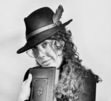E.G. Stone's Blog, page 4
September 6, 2023
Book Review: The Trillias Gambit by JV Hilliard
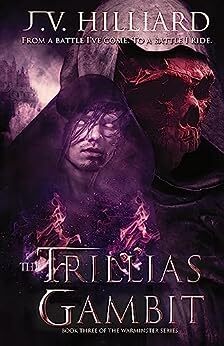
It is nice to see a story come into being, whether that be over one book, or throughout a series. The Trillias Gambit definitely provided some of that “coming into ones own” in the Warminster series.
1. Thoughts on the plot
This book is the third in the Warminster series and follows the continuing adventures of Daemus Alaric, Keeper of Erud. It also follows Ritter, Adalynn (sp?) and many others whose adventures make this series the epic adventure that it is. I won’t go too deeply into plot because of potential spoilers, but know that war is on the horizon, both the expected one and something much, much more dangerous.
I think the plot was fairly straightforward given how many POV characters there were. There were four or five things that had to happen and I think each of them was accomplished quite well. I wasn’t expecting quite so many character deaths, though!
2. Thoughts on the characters
As always, I really enjoyed the various characters. It was nice to see familiar faces, as well as a few new ones who made it into the POV chapters. I don’t think there’s much to say on characters, since they are all familiar in the story so far. However, I will say that some of the deaths were completely unexpected.
3. Favourite part
The continuing tragedy of Ritter is probably my favourite bit. It’s just so inevitable!
4. Critique
I will say that I do wish the POV didn’t jump around quite so much. There could have been several of the same character’s chapters together and I don’t think the story would have lost anything in the telling, and would perhaps have gained slightly more flow. Instead, I was trying to keep up with many different characters while the story jumped a bit. It worked, but it took a bit of following.
Overall, I would say that The Trillias Gambit was a very good continuation of the series and I am keen to see what happens next!
The post Book Review: The Trillias Gambit by JV Hilliard appeared first on Quill and Pen Society.
August 23, 2023
Book Review: Pandora Unleashed by A.A. Warne
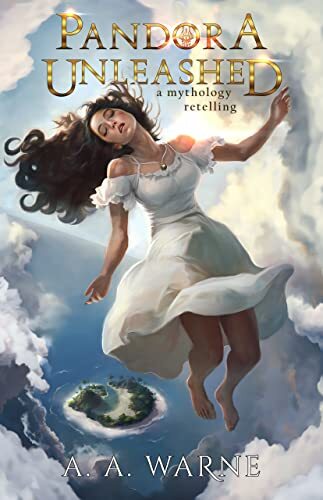
I love retellings. Myths, fairytales, all of it. It’s like candy to me. So when I got to read Pandora Unleashed by Amanda Warne, I was thrilled.
1. Thoughts on the plot
This novella is a reimagining of the original Pandora’s Box myth, involving Prometheus and the other gods as well. It deals with Pandora (or Ora) and Prometheus (or Rome) as they try to curb the greed and disinterest of the gods towards the humans. Pandora is banished for her actions, and Prometheus tries to find her, all while hiding from the gods the fact that he stole the sacred flame. They love each other, and there is nothing in this world stronger than that bond. Not even the gods.
This was a very quick read, so the plot moves fast. That’s perfectly fine, though; I don’t need the politics or the descriptions of the gods’ wrongs towards the humans. It’s primarily a story about justice and love, and I think those themes come through very well. I will say that the ending was very quick (almost quicker than the rest of the story) and I would have liked to linger just a bit on the final outcome. However, it fit well with the rest of the story and I liked it.
2. Thoughts on the characters
Ora is, at first, a difficult character to get to know, simply because Zeus stole her memories. I happen to enjoy the “lost memories” trope, though, so I was happy to discover who Ora was right along with her. Rome was a more complete character right from the beginning, which made his journey very intense, as he had a distinct purpose and goal in mind, and was trying to hide that goal from his fellow gods. I think the contrast between the two in terms of development was very well done, and I like them both quite a bit.
3. Favourite part
The bit where Pandora goes slightly crazy when dealing with the gods? Yeah, that bit is definitely my favourite.
4. Critique
My only real critique is what I stated in part 1: the ending was a bit abrupt and I wish it had lingered just a bit. However, given that the ending fit well with the rest of the story, I can’t complain too much.
Overall, I would say that Pandora Unleashed is an imaginative, entertaining reimagining of the Pandora’s Box myth, and I enjoyed it quite a bit. Very good.
The post Book Review: Pandora Unleashed by A.A. Warne appeared first on Quill and Pen Society.
August 21, 2023
Word Nerdery: Disability in Fiction
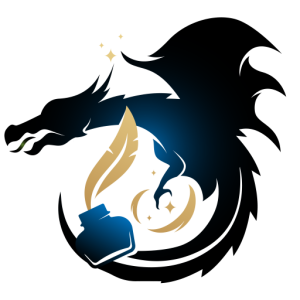
I think it’s time that I talk about the crossing over of real life to the world of fiction. Specifically, I wish to talk about disability in fiction, and the fact that not everything can be fixed. Sometimes, there are no magical solutions for difficult things, and that’s okay.
I’m disabled. I have a condition called Hypermobile Ehlers Danlos Syndrome, which basically means that my connective tissue is all sorts of wonky. Therefore, my joints are unstable and can pop in or out at random intervals. Over the last six years, my joints have become increasingly problematic, which has changed my life. My knees are the worst, but any and all joints can and will be involved. Sometimes, I can get by with minimal amounts of pain and will only need my cane. Sometimes, I’m in enough pain that I need my wheelchair. And some days, the joints that are affected run throughout my entire body, so while I need my wheelchair, I can’t push myself around and am basically bed-bound.
It’s a difficult condition, and it has come to dominate my life. I have several comorbidities involving my digestive system and my immune response to allergens. Between these and the pain, I am managing this disease on a day to day basis, and even considering a simple activity like going to the bookstore relies on acknowledging this disease.
It sucks sometimes.
Most of the time, though, it’s just how life is. There’s really no point in laying on the floor, weeping, as I’d then have to claw my way back up to standing, and that’s a bother. So I get on with life. I have to make accommodations, but life goes on. Time, as they say, marches relentlessly forwards, and I must too or be left behind. It’s not bravery, it’s not inspiring, it’s just life.
However, since my disability has come to fruition, I’ve found that I like reading stories about other people with disabilities or difficulties, and that I enjoy writing those stories even more. The books I’ve read, though, don’t really make sense to me.
Unless written by people with an intimate connection to disability, most books tend to romanticise it. The disabled person is almost always a side character, and they sit around longing for a normal life, totally dependent on the main character to take care of them. While a lot of disabled people need care, and we all do long for normal, I haven’t met all that many people who just sit around and dream. We get on with things to the best of our ability.
For those disabled people who are the main characters (and here I’m discounting deformities like scars), a lot of time there is a magical cure, and suddenly the disability was like it never existed. This is especially true in fantasy novels, where there is actual magic, but it happens in other books, too. Romance, especially, has miraculous cures. It also has unrealistic expectations of disabled heros or heroines being so attractive and moody that the love interest just falls head over heels. I see this primarily in wounded veteran stories where the hero just hates himself, but the heroine loves him so fiercely—despite the disability—that he decides to live another day. Blind romance stories are especially common.
“He loves her despite not being able to see her!”
“Love is blind!”
Etc.
Now, I’m not saying that there’s anything inherently wrong with wanting to cure disability. Frankly, if we could do away with disabilities, then our world would be a massively better place. It’s not going to happen, though. People are always going to have disabilities, have health issues or injuries that make living a normal life almost impossible.
That doesn’t mean we can’t live.
In fiction that is written by people with disabilities, I see a lot more of the main character’s issues just being regular issues. The story doesn’t hinge on them being “broken,” it’s just another aspect of character development. The plot doesn’t involve some magical cure to fix them, because despite not being able to live as normal people do, they’re living their life.
Not every problem can be fixed, but nor does every problem need to be fixed.
Do I wish that I could do normal activities again? Sure. I’d love to be able to hike miles and miles rather than short bursts of walking. But I’m also still doing things that I love. I’m writing books. I’m reading books. I’m editing books. (Sense a theme here?) I’m sewing. I’m drawing. I’m creating.
I don’t need to be fixed. I can continue living as I am, and I’ll be fine. Yes, there’s pain, but it’s not the end of the world. I don’t need the pity filled stares when I’m out with my cane and service dog. (To be fair, most of the stares I get when I’m out with my service dog are of the, “Dog! Dog! I want to pet the dog but I can’t because it’s working, but it’s so cute and ohmygosh dog!” variety. I get almost no notice at all.) I certainly don’t need stories where disability is something to be fixed no matter what.
I’m pleased to note that there are more disabled characters appearing in popular fiction. Yes, it’s still a small percentage, but frankly, we aren’t a massive percentage of the population to begin with. I’ve found loads of disabled fiction stories that are really good, and they’ve begun to outweigh the bad.
The thing is, though, I’d love for stories to one day treat disabilities like any other character trait. She’s got blue eyes. He’s got brown skin. They’re disabled. It’s just a part of who they are, and it doesn’t need to be changed.
Not every demon can be slain; some will linger in the shadows, no matter how much light you bring to the room. Disability sucks, of that there is no doubt. But it’s not the end of the world. We don’t need accolades for dealing with pain, but nor do we need to be carried. We just need to live as best we can. In fiction and in real life.
The post Word Nerdery: Disability in Fiction appeared first on Quill and Pen Society.
August 11, 2023
Book Review: Six Days in Detox by Dianne Corbeau
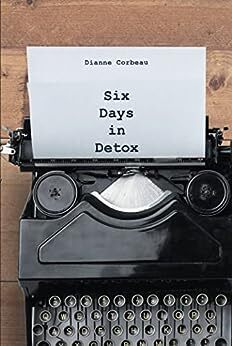
The world is a difficult enough place that sometimes, it’s good to be able to go through the story of someone’s struggles and how they came out on top, if only to understand that it can be done. Dianne Corbeau’s Six Days in Detox is the story of beating struggles, very much against the odds.
1. Thoughts on the events
This is a memoir following the author’s final stint with alcoholism and then going through detox in her journey to get sober. The story starts with her being so sick that she is near death. She goes to the hospital, but while they can help with the initial treatment, further treatment is not possible because they don’t treat both manic depression and addiction at the same time. Therefore, the author is sent to a facility an hour away. There, she is subjected to what amounts to medical abuse while going through her detox. Spoilers: she gets through it through sheer determination and faith.
Honestly, I have no idea what I was expecting when I picked up this book. I knew that it was a book about recovering from addiction, and that it would likely be harrowing, but this book was a lot more than that. Having chronic medical issues myself, I am already a bit wary of the medical world, but to read what happened at this facility was, truth be told, horrifying. I’m desperately glad that the author got through it, but it was difficult for me to read.
2. Thoughts on the author and journey
I half-expected this book to be one of the stories you see that are so popular these days; despite the struggles, the author tone stays positive throughout. Sometimes too positive, to the point where it seems fake. This book was not like that. The author was upfront and open about her struggles. She delved into the darker thoughts and the reactions to things that were beyond her control. There were absolutely messages of hope in the story, but they weren’t the only thing. Because, frankly, there is a lot of darkness out there and sometimes it needs to be acknowledged before we can move on. I really liked that perspective.
3. Favourite part
I think the little milestones the author mentioned were so well described and portrayed that it felt like I was reaching for them with her. I really appreciate that.
4. Critique
My biggest critique for this book is that it had quite a few grammatical errors. It was not at all difficult to read, but I am an editor as well as a book reviewer, so I am used to reading a story through such things. If you are easily distracted by those errors, this book may be difficult to get through.
Overall, I would say that Six Days in Detox was a very good memoir and I would definitely recommend it to anyone who may be struggling with their own demons, whether that be addiction or something else. I will warn you, though, if you are easily triggered by medical trauma/abuse, this book may not be for you.
The post Book Review: Six Days in Detox by Dianne Corbeau appeared first on Quill and Pen Society.
August 7, 2023
Word Nerdery: Did Not Finish – Some Insights into the Life of a Book Reviewer

I didn’t realise that I read quickly until I was told that my average of two to four books a week wasn’t normal. I thought that those who chose to read were of a fairly similar pace to me, and it was a bit shocking that I was wrong. Now that I think about it, of course, it makes sense. My goodness, do you know how complex books are?! Just because my brain is wired for words (I’m neurodivergent, I mean this literally) doesn’t mean that everyone’s mind works in the same way. And that’s perfectly alright! Read one book a month. Read one book every six months. Read a book a day (I’d be very impressed with this). Read everything. Read nothing. It’s all a matter of personal preference.
Unless, of course, you’re taking an English class or other related academic course, and then you’d better read the books you’re assigned. Even if they’re terrible. Sorry.
Which actually brings me, in a roundabout way, to my main point of this article. I am a book reviewer. I read a lot of books, averaging about 200 a year. Most of these are indie books, sent to me by authors who signed up for my review service. And while I am very pleased with that number, the number I don’t often share is how many books I DNF (Did Not Finish) in a year.
It’s probably closer to 400.
Yes, you read that right.
For every book I read, I DNF two.
Usually, I can tell within the first 10% of a book whether I’m going to like it. This is to do with the prose, narration style, characters, and content of a book. If I have a difficult time understanding the language, because there are too many similies or everything is convoluted and nothing is stated outright, or even if the characters do some questionable things, then I will immediately DNF the book and move on. Sometimes it takes me up to 50% of a book before I’ll give up, but usually if I’ve made it that far, I’ll finish the book.
I used to feel badly about this. People were sending me their books, hoping I’d review them. I never charge for reviews, only ask that I get a copy of the book. So I felt guilty that I didn’t finish a book. However, I know that if I finish reading a book I do not enjoy, then the review is going to be unfavourable, and I hate writing bad reviews more than I hate disappointing authors.
Some authors will say that a bad review is still a review and that the algorithms don’t care one way or another. Other authors will obsess over every review they get, and can take a bad review to heart in the worst way. Personally, I don’t read my reviews, for many different reasons. However, I also don’t want to discourage other authors, because they’ve done a great thing by writing and publishing a book, and most of the time, the reasons why I don’t like a book are purely subjective. Therefore it’s not helpful for me to review negatively. Nor do I review books I don’t finish, but that’s because I haven’t gotten the full story. Essentially, if I finish a book, it automatically gets three stars, because it held my attention long enough to follow through. And that, I think, is worth a review.
Yes, I will fully admit that I am picky. I have a background in linguistics, I’ve been practising story craft for many years, and I read a massive amount. I know very quickly, therefore, what stories will be interesting to me. I can point out what works and what doesn’t, and I am fully able to admit when something is an objective problem or a subjective one. (Objective problems are mostly to do with editing.)
There are millions of books in the world, and millions more are published every year. Traditional publishing and hybrid publishing and self publishing, it doesn’t matter. There are multitudes of books, and I am happy to give them a try. But if I don’t like a book, then there is little need for me to worry about finishing it. I read many books I didn’t like during my English class days, and I burned to have the freedom to choose my books. Now that I have it, I will exercise that freedom and move on to a new book.
Because there is always more for me to read, and I want to read it.
The post Word Nerdery: Did Not Finish – Some Insights into the Life of a Book Reviewer appeared first on Quill and Pen Society.
July 28, 2023
Book Review: Heart of Pangaea by Lindsey Kinsella
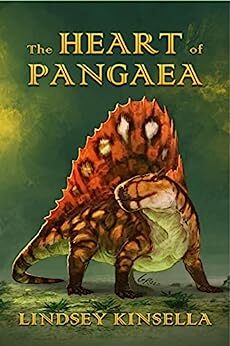
While not as intense as some people’s interest, I do have a fondness for dinosaurs (and related creatures). Rarely, though, do I get a chance to read a book involving dinosaurs. (For some reason, they’re not the most popular thing to put in a fantasy novel, though they are very cool.) So when I got a chance to read The Heart of Pangaea by Lindsey Kinsella, I jumped on it. Because dinosaurs.
1. Thoughts on the plot
This book follows Robyn and her dimetrodon “imaginary” friend, Ed. They are dealing with Robyn’s mum being sick, and in the wake of some terrible news, they attempt to find a cure. Where? The world of Pangaea, which Robyn has populated with dinosaurs (and other, related creatures0 from all ages. Once in Pangaea, Robyn is told of a cure called the Heart of Pangaea, but there are treacherous forces out there trying to steal the Heart and use it for their own gain. Robyn must get it back, even if that means befriending pirates and mammals and launching an attack on a moving fortress.
I was not expecting to enjoy this book as much as I did. Normally, middle grade books are, to me, a bit heavy on life lessons and a bit lacking on plot and character. This book was not like that at all. I really appreciated the twists and turns and all the difficulties that Robyn had to deal with. I liked the “false” ending and then the real ending. I think that was really well done. And I definitely think that this plot was one of the more inventive I’ve seen in a middle grade (or even YA) book for a while.
2. Thoughts on the characters
This book is narrated in first person limited perspective by Ed, the dimetrodon. There were occasional snippets of third person limited when it was necessary to see a different POV, but most of the book was narrated by Ed. And, frankly, I really liked that. Robyn was obviously the hero of the book, so to have the book narrated by her “imaginary” friend was a great touch. It gave us perspective into Robyn’s thoughts without actually seeing the story from her point of view.
As for the other characters, I really like the different personalities and people that we meet in this book. I think the variety is exceptionally well done, and I liked them all. Even the villains.
3. Favourite part
I think I really like the raid on the giant sauropod. That was so inventive and well done.
4. Critique
I will say, that, although I really liked it, the “false” ending and the subsequent “true” ending came on a bit quick. Robyn’s change of heart was definitely perfect for the plot, but it felt the teensiest bit like a plot device rather than a character choice. I think it worked out great in the end, and I really like how the story turned out, but I think a little more introspection would have been great.
Overall, I would say that The Heart of Pangaea was an extremely enjoyable book. I liked it a lot and I heartily hope that there are more in the series. An excellent book.
The post Book Review: Heart of Pangaea by Lindsey Kinsella appeared first on Quill and Pen Society.
July 26, 2023
Book Review: My Second Life by Simon Yeats
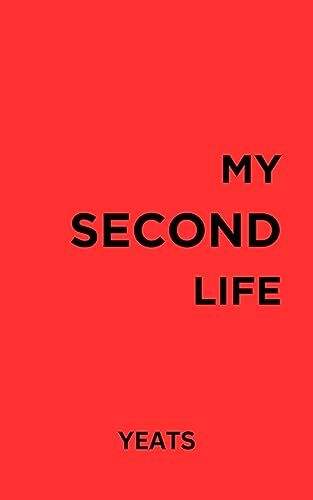
It’s been a while since I have read an autobiography, so I was intrigued when My Second Life by Simon Yeats crossed my desk.
1. Thoughts on the events
This book follows the author (duh, it’s an autobiography) as he goes through the events of his first life and into his second. He details meaningful events from childhood through adulthood, such as being boxed by a red kangaroo, climbing (and descending) a mountain, a car accident. Most of the book, though, deals with his relationship with his ex-wife. She was from Brazil and while the relationship was at first good, she spent more and more time in Brazil, demanding more and more money. Eventually, she took their son with her and never came back. This lead to years of legal drama, trying to see his son, and an uncertain future.
I found the events detailed here very interesting. They were mostly on the negative side, with the author focusing on traumatic events (such as the kangaroo) and being bullied. He holds up his father as a paragon of fatherhood, but the father rarely plays a part in this story. I will admit, it took me about a third of the book to actually get invested in the story, but eventually everything started to move and became more intriguing. Where the book ended, though, was very abrupt and left the reader hanging in quite a dramatic fashion. (Yes, I know this is often the case with autobiographies, given that the author is still alive and can’t write their own future.)
2. Thoughts on the figures
I think the author did a good job detailing people and events that had an impact on him without going into detail that was overwhelming. I would, however, have liked to know a bit more about certain figures in his life, such as his father and siblings. They were all mentioned as being significant, but the amount of time spent on them was minuscule compared to the rest of the book. If they had such a profound influence, I would have liked to know more.
3. Favourite part
The way this book was written was, at first, very choppy. There are many, many fragments of sentences that should have used commas instead of periods. Being a linguist, editor, and author myself, this was at first off putting. However, the more I got into the book, the more this style actually appealed. It worked very well to inform the author’s voice and direct the story. It’s an unusual means of providing emphasis, to be certain, but in this instance it worked very well.
4. Critique
The focus of this book is on the transition from first life to second life. This is mentioned throughout the story in various different places. However, only once, and in one sentence, is the concept of what a second life is explained. It’s very near the end of the book (the penultimate if not the final chapter) and before that, all that is present is references to being in the first life or when the author gets to his second life. Frankly, the concept of first life versus second life plays such a minimal role in the book that it’s very nearly irrelevant. The main premise of the book is a father’s devotion to his son, despite difficult circumstances. The framing of the book around the first/second life concept is philosophically interesting, but as the concept is not really expanded upon in any great detail, it feels very artificial.
Overall, I would say that the autobiography is a good one. It did take a while to capture my interest, and there were difficulties I had with the pacing and structure of the story (especially at the end), but it was worth a read. A good book.
The post Book Review: My Second Life by Simon Yeats appeared first on Quill and Pen Society.
July 21, 2023
Book Review: In Mint Condition by ML Ortega
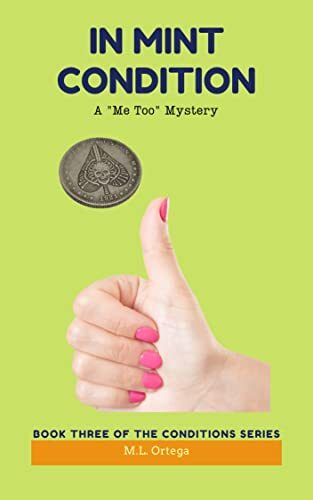
I like mystery novels; in fact, before I dived deep into the realm of fantasy, I inhaled mystery novels like you wouldn’t believe. I still try to read as many as I can, interspersed with books about dragons of course. In Mint Condition by Margie Ortega definitely tickled my fancy, being a cozy mystery with a bit of darkness to it.
1. Thoughts on the plot
This book is actually the third book in the series, and while I really hate starting a series in the middle, this read relatively like a standalone. It follows Maggie, who is dealing with some past trauma, as she navigates the world of estate sales and antiquing-for-profit. On her trip to get a jar appraised, she discovers a dead body. Only, she knows this man; it’s her former abuser. Desperate to not paint herself as a suspect, Maggie has to solve the mystery, which deals with antiques, crime, and a whole slew of suspects.
Now, there were definitely some moments where I felt like I was missing things likely mentioned in previous books, but on the whole I was able to piece together past experiences and character relationships quite well. The mystery itself was pretty straightforward, though some of the extra criminal connections felt as though they were thrown in to make the crime more dastardly. The interesting piece for me, though, was more to do with the characters than the mystery.
2. Thoughts on the characters
I like Maggie. She is doing her best to get over her past trauma and live a good life with her kids and boyfriend. She has spunk and definitely rushes into danger without looking both ways, but I think that’s what makes her entertaining. I do wish that some of the relationships were delved into a bit more; they felt a little surface level. (However, this could be a product of me not having read the first books, where the relationships were explored more, leaving this book to display them as a matter of fact, not exploration.) Her relationship with Jane is especially interesting to read.
3. Favourite part
I think, and this sounds quite terrible, but Maggie’s past and her ability to overcome it is perhaps my favourite part. It’s what made her feel almost real, rather than a character on the page. The rest of the time, her actions didn’t quite match up with what I would expect a person to do (such as rushing into danger rather than away from it) but that particular piece of character development worked very well.
4. Critique
I would say that the actual mystery was a bit generic. The suspects were a little obvious, and the clues weren’t arrayed neatly throughout the story but mostly thrown in near the end. It probably could have been solved much earlier if Maggie would have actually talked to the police (her boyfriend is a police officer, so this makes it doubly confusing) before rushing into her own investigation. There were also threads of investigation that were just abandoned as soon as something else happened (specifically with Diana), which is actually the most realistic part, but didn’t really fit well into the story.
Overall, I would say that In Mint Condition was an entertaining cozy mystery, but that it had more character than mystery. I would say that this was a good book.
The post Book Review: In Mint Condition by ML Ortega appeared first on Quill and Pen Society.
July 19, 2023
Book Review: NACL Eye of the Storm by Allegra Pescatore and E. Sands
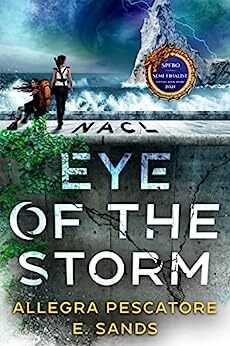
There are some authors who manage to draw you in, no matter what sort of adventures they take you on. Allegra Pescatore and E. Sands are those authors. Every book I’ve read in the Ao Collective-verse is enthralling, fascinating, full of diversity that feels real, and characters that will tug at your heartstrings, no matter how villainous.
1. Thoughts on the plot
This book takes place on Fortune, a world that depends on the salt from the Salt Spire, claimed and managed by the Corporation. Those with Marks have magic that could change the world, but they, too, are controlled by the Corporation. All but a few, that is. And those few are being gathered together by an ancient Marked madman to destroy the Spire. Pirates, magic, romance, and more abounds in a book where drama is the baseline.
Okay, this plot is, generally speaking, a heist novel that takes place in a fantasy world. Only, it’s so much more complex than that. It has people trying to figure out what is right for the world, people just trying to eke out a living, plots from gods and humans and madmen (and women) alike. Just when you think you’ve got a good grasp on things, there’s a twist, a tweak, a nudge in a different direction. This book is also dark. It delves into some very deep places, but I really like that it also gives the characters a chance at facing their fears and recovering from the trauma. Also, Moe. Just…Moe.
2. Thoughts on the characters
There are several primary characters in this book: Lani, Kuma, Salome, Vera, Torin, and Moe (Moe!) and I like the chance to explore each and every one. I think it really lends them a sense of depth, looking at the centre plot from the various narrow and flawed perspectives. This is not something that is easily managed in books with multiple POVs, but this book definitely pulls it off.
I think Vera and Lani are my favourites, just because they get a chance to embrace their inner darkness without necessarily becoming evil. I really appreciate that, as it is a fine line and not easy to pull off. Torin is also a fascinating character, simply because of his counterpoints. And that twist at the end? I can’t say I was surprised, but I was definitely seriously shocked, if that makes sense.
Also, Moe.
3. Favourite part
The end, where all the pieces come together and we figure out just what happened at the Spire, which has been hinted at since the beginning. I love watching things come together like that.
4. Critique
IT ENDED! No, really, that’s the only critique I have. I really liked this book and I was seriously bummed when the story ended. I have a feeling there will be more, just based on the way some of the plot points terminated, but I can’t say for certain. Most definitely this book intertwines with other books about the Ao Collective, which I really enjoy.
Overall, I would say that NACL: Eye of the Storm is a great fantasy adventure with pirates, a heist (of sorts), magic, romance, darkness, grit, and an array of humanity. An excellent book.
The post Book Review: NACL Eye of the Storm by Allegra Pescatore and E. Sands appeared first on Quill and Pen Society.
July 18, 2023
Word Nerdery: The Rise of Young Adult Fiction
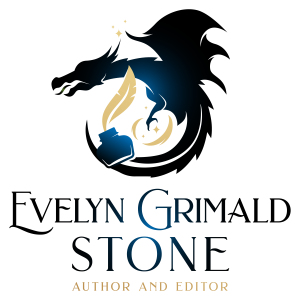
When I was young, about eight or nine or so, there wasn’t a lot of fiction that was age appropriate for me. That is, I was reading at such an advanced level that the usual books about kids my age—the Magic Tree House series and its like—were fairly juvenile. Then, I discovered Harry Potter.
Now, at this point, there were only four or so books out, so it all felt very new and intriguing. And it was. Nothing else like this was really available for a younger audience. A lot of times, going to the bookstore felt more like jumping from kid’s books, which I had already outgrown, to adult books. So I devoured Harry Potter.
The rest of the time, though, I was reading things like Jane Austen, Shakespeare, Jane Eyre, Sherlock Holmes, Little Women, and other such books. Literature, to be precise. From a different century. Then, I learned about such things as murder mysteries, and I was hooked. There were a few variations on such readings that were slightly more age-appropriate, such as the Warrior cat series by Erin Hunter, and eventually Anne McCaffrey books, but primarily, I was reading adult fiction simply because there wasn’t a lot out there.
How can that be, you may ask. There are hundreds, thousands of books written for kids and teenagers as a specific audience. And that is true, now. But at the time of my youth, such things were fairly new. I remember when Twilight was so mould breaking that it engulfed my school like a storm, when now it’s considered to be highly toxic. The Hunger Games and Eragon were new, different, and written about people my age!
I was shocked.
And fascinated.
And definitely interested.
But the truth of the matter is that until recently, people just weren’t publishing books aimed at that in-between age group. Oh, sure, there were a few books that people would read regardless of age, like Tolkien or Robert Jordan or The Golden Compass and the like, but truly, there wasn’t a massive amount marketed to teenagers and kids specifically.
I remember when kids books were produced in those flimsy covers that fell apart after a week of reading, with paper that was just as bad. Of course, if the story took you a week to read, being maybe 150 pages of large print font, then it was a shock. Think Goosebumps.
Suddenly, though, things changed.
What was it?
Well, as much as the modern world doesn’t want to hear it, the big change was Harry Potter. Despite Rowling’s unpopularity in social media these days, when the books came out, she was a revolutionary. There just wasn’t anything like Harry Potter for kids. Even adults read the stories and were fascinated. That’s why she’s a billionaire; her books were novel, filling a gap that was desperately wanting. People devoured those books—I devoured those books—and they became the identity for so many people my age. Suddenly, it was cool to read. Being a nerd, while not yet mainstream, was becoming more acceptable.
There was again magic in books, and not just for adults.
Publishers demanded more. They wanted to sell books to that hungry audience and make the fortune that Rowling made. So authors answered the call.
Now, just about any bookstore I go into has a dedicated section to YA fiction. There are stories about magic, mystery, social justice, more. Yes, most of the books are fantasy-oriented, but that really is only a tip of the iceberg. These books are meant to help teens (and really anyone who reads) leap into the great, wonderful abyss of adult fiction. They are where a lot of the innovation in the book world arises, and the younger age group is now leading the book world, rather than just sort of following.
YA rose from a vacuum and now dominates a large part of the book market. (It may not out perform romance books as a genre, but it does very well.) In fact, a large part of the readers of YA fiction are adults, simply because it fulfils a need that isn’t often available.
There is some debate on when YA fiction delves into New Adult fiction, depending on the age of the protagonist and the content, but generally speaking, YA is its own category of books. And I, for one, am glad of it.
I read voraciously, and I am thrilled that there are books for the desperate, book-hungry teenager that I was. That there are books that fill the gaps. That there are books which introduce new worlds to a younger audience without making them feel patronised or ignored. These books give them a voice. And so, criticism aside, I’m glad that Harry Potter happened. Because it sparked a movement, and it changed the world.
The post Word Nerdery: The Rise of Young Adult Fiction appeared first on Quill and Pen Society.

